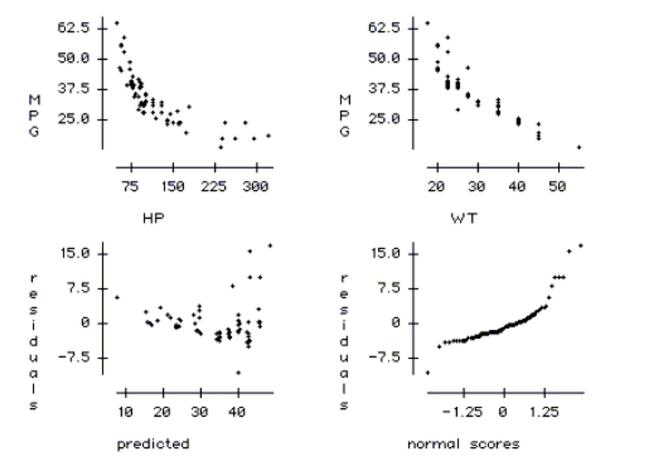Engineers want to know what factors are associated with gas mileage. The regression
below predicts the average miles per gallon (MPG) for 82 cars using their engine
horsepower (HP) and weight (WT, in 100's of pounds). Dependent variable is
R squared R squared (adjusted)
with degrees of freedom
\begin{tabular} { l c l c c }
\multicolumn{1}{c} { Source } & Sum of Squares & df & Mean Square & Fratio \\
Regression & & 2 & & 184 \\
Residual & & 79 & &
\end{tabular}
a. Write down the regression equation.
b. Write down the hypotheses for the test of the coefficient of horsepower. Conduct the test
and explain your conclusion in the context of this problem.
c. Write down the hypotheses for the test of the coefficient of weight. Conduct the test and
explain your conclusion in the context of this problem.
d. Explain the meaning of the coefficient of weight in the context of this problem.
e. Explain the meaning of the intercept of this regression in the context of this problem.
f. Compute the predicted gas mileage of a 3500 pound car with a 150 horsepower engine.
The plots are MPG vs. HP, MPG vs. WT, residuals vs. predicted values, and a normal
probability plot of residuals. 
g. Check the conditions of this regression and comment on whether they are satisfied.
Correct Answer:
Verified
b.
The p-value associated with hors...
View Answer
Unlock this answer now
Get Access to more Verified Answers free of charge
Q18: Of the 23 first year male
Q96: Mistakes. Describe the mistake made in the
Q157: An 8th grade class develops a linear
Unlock this Answer For Free Now!
View this answer and more for free by performing one of the following actions

Scan the QR code to install the App and get 2 free unlocks

Unlock quizzes for free by uploading documents